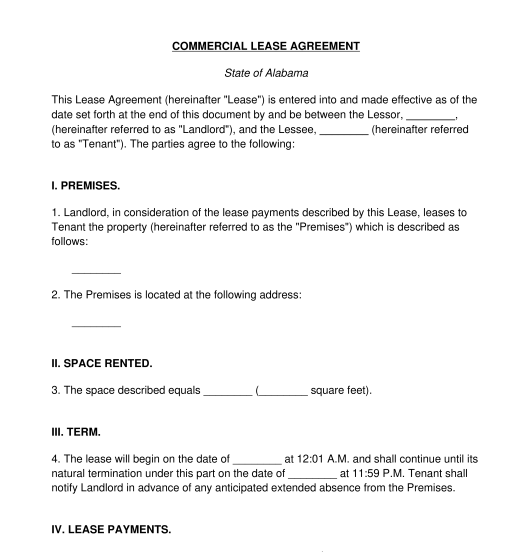 11/24/2025
11/24/2025

Answer a few questions and your document is created automatically.

Your document is ready! You will receive it in Word and PDF formats. You will be able to modify it.




Rating: 4.8 - 713 votes
Download a basic template (FREE) Create a customized documentA commercial lease agreement is a document outlining the responsibilities of a landlord and tenant when a commercial property is being rented. A commercial lease agreement acts as a legally binding contract which allows a business the right to occupy the Landlord's property for business or commercial activities in exchange for paying rent.
For more information about commercial lease agreements, please refer to the guide Leasing a Commercial Space: Find the best fit for your business.
Commercial leases generally fall into two categories. The first type of commercial lease is when a business rents a portion of a landlord's building that houses multiple commercial tenants. The second type of commercial lease is when a business rents an entire building from a landlord. This document can be used for either of these situations.
Though both documents are meant to facilitate a landlord and tenant arrangement, they are used in different situations. A commercial lease is used when the tenant plans to do business in the space they are renting. A residential lease agreement is used when the tenant plans to live in the space they are renting. Each type of lease includes provisions specific to each of these purposes.
No, it is not mandatory to have a commercial lease agreement. A landlord and tenant are free to enter into a rental relationship without creating a formal contract memorializing the arrangement.
However, using a written lease agreement is highly advisable because it protects both the landlord and the tenant. By making each party's rights and responsibilities clear and upfront in writing, potential misunderstanding is avoided.
A security deposit is money paid from the tenant to the landlord at the start of the lease. This money is often the equivalent of one month's rent and is meant to be used by the landlord to cover any damages that happen to the property through the fault of the tenant. At the end of the lease, if there is no damage, the security deposit is returned to the tenant.
In the context of a commercial lease agreement, exclusivity is when the landlord agrees not to rent to any other tenants who have a similar type of business to the tenant making the lease. For example, if the tenant is a coffee shop, an exclusivity clause would specify that they be the only coffee shop that is allowed to operate on the premises. The landlord would be barred from renting any other spaces on the premises to other coffee shops without prior written consent from the tenant.
The tenant might be required to get additionally insurance for the whole period of renting the property.
Property insurance is used to cover any damage to the property that may occur. Typically, if the tenant is renting a space inside a larger building, such as an office in a high rise, they are responsible for maintaining property insurance on the space while the landlord is responsible for maintaining property insurance on the entire building. In situations where the tenant is renting an entire building, they are the only party responsible for obtaining and maintaining property insurance.
Liability insurance covers any legal fees or other losses that arise from injuries that happen on the premises and result in a lawsuit against the business. A commercial lease may require that the tenant maintain a certain amount of liability insurance.
There is no maximum or minimum amount of time that the lease agreement can last. However, most commercial lease agreements are for a period of years, as businesses generally try to stay in the same place for as long as possible.
When the agreement is written and all the relevant information has been included, both the landlord and the tenant should sign and date the document. The parties should each keep a copy of the agreement for reference and in case of future dispute. The signing does not need to be witnessed, and the document does not need to be notarized for it to go into effect.
A valid lease agreement must contain at least the following mandatory clauses:
Commercial lease agreements are governed by a combination of federal, state, and local laws. The Americans with Disabilities Act, a federal law, mandates that all public buildings be accessible to people with disabilities. Commercial spaces must have accommodations, such as wheelchair ramps and larger bathrooms, to comply with this law. Environmental protection laws, such as the Clean Air Act and the Clean Water Act, govern environmental standards. In a commercial space, this may affect things such as waste disposal or manufacturing practices.
Local zoning laws impact how spaces may be used. Only buildings that are zoned for commercial use may be used to conduct business. There can also be restrictions on the types of businesses that are allowed to operate in a particular space. Local laws usually control building and safety codes that dictate structural requirements, occupancy limits, and fire safety.
A commercial lease agreement is a binding contract that will be upheld in a court of law in any state. When there is a written agreement, courts generally uphold the terms of the agreement. In contrast to many of the common and implied protections contained in a residential lease and the associated laws, these protection laws do not exist for commercial leases. Therefore, the commercial lease itself must contain the entirety of the agreement and the terms that the parties agree to be bound by.
You fill out a form. The document is created before your eyes as you respond to the questions.
At the end, you receive it in Word and PDF formats. You can modify it and reuse it.
Guides to help you
Commercial Lease Agreement - FREE - Sample, template
Country: United States